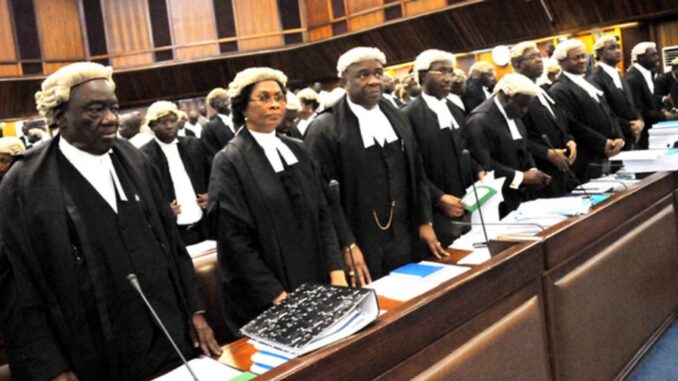
Does the above majority decision satisfy the true meaning of Justice in the real sense of that word? Has justice being served here? Personally I don’t think so, the choice of the people have been thwarted there using undue technicality.
There are at times our courts in the land have engaged in self realization and refused to be bogged down by technicality over substance. Kenyan and Malawi Supreme Courts in the two cases referenced above were vociferous in their majority decisions in upholding substantial justice over technical justice. Even the Supreme Court of Nigeria as far back as in 2007 in an unprecedented judicial audacity in the case of Rotimi Amaechi Vs Celestine Omehia sacked Omehia, affirming Rotimi Amaechi as the winner of an election in which he did not campaign. In reasons issued in January, 2008, Hon Justice Adesola Oguntade retired, who read the lead judgement to which other 6 justices concurred had this to say: “The sum of the recent decisions of this court is that the court must move away from the era when adjudicatory power of the court was hindered by a constraining adherence to technicalities.
This often results in the loser in a civil case taking home all the laurels while the supposed winner goes home in a worse situation than he approached the court”. Hon Justice Olayiwola Aderemi added his authoritative voice to this issue. He said “This court has a standing and rigid invitation to do substantial justice to all matters brought before it. Justice to be dispensed by this court must not be allowed to be inhibited by any paraphernalia of technicalities”.
While at the Court of Appeal our respected Justice John Okoro now at the Supreme Court had this to say concerning technicality over substance. In the case of Balogun V E.O.C.B Nigeria Limited, he was said to have held.” Good law in my opinion must have a human face; good law should not patronise technicalities that will give rise or room to undeserved victories in litigation. Good law will not encourage a situation where a party in litigation will only return home with pyrrhic victory which in reality is no victory at all”.
The real reasons for judicial intervention
The real essence of the Court’s intervention in election matters is to promote democratic culture and strengthen the confidence of the people in the democratic process. But if we reduce our courts to the role of counting votes of the electorates or voting for the candidates that should lead, we are destroying the judiciary and at the same time destroying democracy.
If we create crisis of confidence on the judiciary in their role of intervening in electoral issues, then we are in very serious danger. Already the politicians are taking undue advantage of some judicial lapses to wreck havoc in the system. They are ready to manipulate, rig, create chaos and ‘win’ by foul means and challenge the ‘loser’ to go to court having known that the judiciary as an institution in the continent suffers some institutional lapses. Institutions generally are not strong in the continent. It leads to loss of confidence and creates very big problem in the long run.
Take for instance the Kenyan Election of 2007. Incumbent Mwai Kibaki was declared winner in that election. However Raila Odinga also claimed victory. Due to his loss of confidence on then judiciary, he prefered other options than recourse to the courts. The consequence was civil unrest breaking out resulting in the deaths of several hundred people and the displacement of up to 600,000 persons. The election was regarded as generally flawed and led to deepening of ethnic divisions and serious post-election violence lasting into 2008.
The same thing in Nigeria in 2007. The general elections of April, 2007 supervised by one Professor Maurice Iwu was adjudged by most observers to fall a long way short of the standards for credible, free and fair elections and to be the worst in Nigeria’s post independence history. The election was so flawed that the apparent winner His Excellency late Umaru Yar’adua considered the said election as deeply flawed. He quickly set up Electoral Reform Committee headed by former CJN of the country to midwife a new Electoral law and system. The Commitee headed by Hon Justice Mohammed Uwais did a good job by recommending very comprehensive electoral reforms which if followed would have made us take some electoral progressive steps as a country but alas the report was thrown into the dustbin till date.
The hope that the judiciary would strengthen democracy by upturning the electoral results that was agreed by local and international observers including the alleged winner as flawed was dashed as the highly manipulated electoral process was upheld as valid by the majority of the Supreme Court of Nigeria.
The Supreme Court upheld the findings of lower courts that the lawyers of the Petitioners had not provided strong evidence to overturn the official result. Embarrassingly, Hon Justice Niki Tobi of the Supreme Court had this to say: We’re not saying that all went well in the conduct of the election. “Laying the blame on the country’s political elite, he said “The way politics is played frightens me. It is a fight to the finish.”
That the courts upheld that election still sent shockwaves to peoples’ marrows till today. This was an election that witnessed widespread electoral malpractices throughout all the stages of the elections. There were failures in the late delivery of voting materials, late commencement of polls in most of the States, ballot box stuffing, allocation of votes where voting did not take place, falsification of votes, deliberate denial of election materials to polling units especially where opponents have strong supporters etc. Despite all these, the Nigerian Courts in 2008 held that the election was free, fair and credible. Incredulous!
To be continued tomorrow
Dr. Ubani is the current chairman of
Election Reform Commission of African Bar Association (AFBA).


Be the first to comment